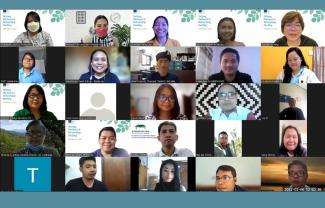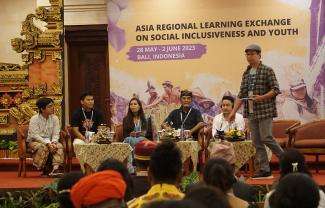Last February 8, 2022, NGOs, non-profit associations and local organizations with whom Samdhana had worked with or had supported came together for the Mekong Partners’ Meeting. Twenty-eight participants from 19 organizations from Myanmar, Thailand, Cambodia, Vietnam and Laos joined the meeting via online. Albeit, it was not face-to-face but the Partners had a meaningful exchange on their current situations, the challenges they have to hurdle, and strategies that for them have been effective. The Partners work on a range of focus or topics, such as livelihoods, women and healthcare, youth capacity development, gender, land governance and natural resources management, nutrition, forest protection, community water system, climate change, land and housing rights, and disability rights. Many are grappling with the situation brought about by the COVID-19 pandemic, especially with communities in remote areas. While many have shifted to online, there is still difficulty in accessing internet connections. Many issues that communities face continue on, and more so because of the pandemic, and these range from land rights, government recognition, agriculture and drought, climate change, illegal logging, lack of access of persons with different abilities, capacity gaps, and military and civilian conflict. COVID-19 has been especially difficult for internally displaced persons in Myanmar who have to contend with the virus while the unrest and clashes are taking place, and force them to seek safer places.
Most of the Partners have been working in their respective countries for several years, honing their strategies to address the issues they focus on. Some partners promote gender and social inclusion in all the processes of development. A number also are experienced in working with other organizations within and outside of their borders to increase opportunities for collaboration. A number also identified their work with government agencies at various levels, and part of the advantage is learning more about the government’s program, to be able to adopt such strategies in their own work. Organizations that promote disability rights coordinate with the Ministry of Labor and Social Welfare, as well as the Committee for Disability and the Elderly. Other organizations apply the collective learning and praxis learning (action-reflection-action) processes.
Partners were asked their thoughts on creating an informal network, and some responded positively, as this would be opportunity for learning from one another, being able to understand the common issues through different political views, as well as opportunity to increase evidence-building to support their work. Others were also open to this idea as it will be a chance for organizations who may be working on other topics to increase their awareness and sensitivity to disability rights and promote inclusion in all their programs. Partners still have a need for further support in capacity development for community members to raise their voices, and to engage government at the regional level and private sector. There were also pragmatic needs that were mentioned such as support for students’ and youths’ capacities for online education, traditional seeds conservation, improving livelihoods and learning how to fundraise. And more urgently were the needs for people who were bearing the heaviest brunt of the pandemic.
The Mekong team and the CapDev Program of Samdhana will follow through with country-level conversations with Partners to further flesh out and inform Samdhana’s work to support Indigenous Peoples and Local Communities (IPLCs) in the coming year.




